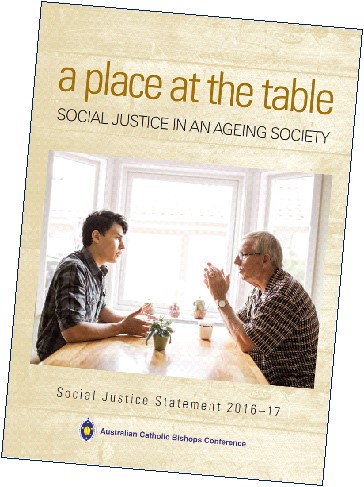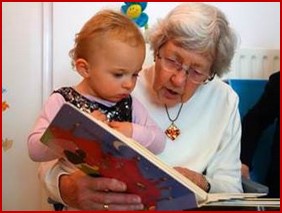Under different circumstances, I would have spent some time with you last week looking at the  Social Justice Statement for 2016-17, A Place at the Table – Social Justice in an Ageing Society, which was released on Social Justice Sunday, 25 September. So I will refer to it in this week’s message instead. You may note that this Statement is for the whole year, not just for one day of the year.
Social Justice Statement for 2016-17, A Place at the Table – Social Justice in an Ageing Society, which was released on Social Justice Sunday, 25 September. So I will refer to it in this week’s message instead. You may note that this Statement is for the whole year, not just for one day of the year.
As part of the Statement, Pope Francis is quoted as saying:
There was a father, mother and their many children, and a grandfather lived with them. He was quite old, and when he was at table eating soup, he would get everything dirty: his mouth, the serviette….it was not a pretty sight! One day the father said that, given what was happening to the grandfather, from that day forward he would eat alone. And so the grandfather ate alone in the kitchen while the family ate in the dining room. After some days, the father returned home from work and found one of his children playing with wood. He asked him: ‘What are you doing?’ to which the child replied: ‘I am playing carpenter’. ‘And what are you building?’ the father asked. ‘A table for you papa, for when you get old like grandpa’.
This story has stayed with me for a lifetime and done me great good.
Grandparents are a treasure.
Interestingly, Pope Francis turns 80 in December. In our terms, he is an old man and yet he is vital enough to lead the world’s 1.2 billion Catholics and to be considered as a significant world leader. His wisdom is accessible through his writings, his homilies and speeches, but mostly through his actions. He demonstrates to us that age is not to be deemed as a hindrance or barrier to share the table with others. Do we recognise those who are aged as a treasure so they have a place at the table?
Pope Francis in his Apostolic Exhortation on Love, Amoris Laetitia, says:
Just as God asks us to be his means of hearing the cry of the poor, so too he wants us to hear the cry of the elderly. This represents a challenge to families and communities, since ‘the Church cannot and does not want to conform to a mentality of impatience, and much less of indifference and contempt, towards old age. We must reawaken the collective sense of gratitude, of appreciation, of hospitality, which makes the elderly feel like a living part of the community. Our elderly are men and women, fathers and mothers, who came before us on our own road, in our own house, in our daily battle for a worthy life’. Indeed, ‘how I would like a Church that challenges the throw-away culture by the overflowing joy of a new embrace between young and old!’(n191)
I recall my great encounters with the aged – as a child, with neighbours, grandparents and great aunts; as a young woman, while working in pathology and taking blood from those in hospitals and aged-care facilities, and then as a Parish Pastoral Associate in Tweed Heads (commonly known as God’s waiting room). My own parents, in their older age, lived with us for about ten years. And now, I also have the honour of ministering with some older people who are actively engaged in the life of the church. In all these settings, I have learnt that becoming older was no excuse for opting out of life, or for not being shown respect and appreciation. I certainly appreciated the many wise older women I have met on my journey, because they have been, and are, significant role models to me. We are living at a time when a large number of people are ageing, and we need to look at those who manage to do it well. By this, I mean, those who remain active and in generous service to the community. As humans, role modelling is essential to living a good life. I realise that not everyone is able to enjoy this productive aspect of ageing, but I also know that there are many who see ageing as a time of self-interest and pay-back for all they have previously contributed.
 In these times of good health care, many of us will live healthy and productive lives till old age, and once again we need to reassess what the ageing process looks like. I certainly know that I am a much younger version of my mum at the same age because of the times in which I have grown up, and Allen is still able to be actively engaged in work and life.
In these times of good health care, many of us will live healthy and productive lives till old age, and once again we need to reassess what the ageing process looks like. I certainly know that I am a much younger version of my mum at the same age because of the times in which I have grown up, and Allen is still able to be actively engaged in work and life.  However, there are others who struggle with their overall sense of wellbeing, and require support and care. On page 8, the Social Justice Statement speaks of the kind of contributions that are so valuable in later life:
However, there are others who struggle with their overall sense of wellbeing, and require support and care. On page 8, the Social Justice Statement speaks of the kind of contributions that are so valuable in later life:
- Spiritual fulfilment
- Rest and leisure
- Time with family and friends
- Volunteering with parish and community groups
- Being present to share a lifetime’s wisdom with younger generations.
In this Year of Mercy, the Social Justice Statement reminds us of our social justice principles:
- The Common Good
- The Dignity of the Human Person
- Preferential Option for the Poor
- Solidarity
- Stewardship for Creation
- Subsidiarity and Participation
Given the aging population, there are many challenges in providing proper care, resources and facilities for those who need our assistance. Many of those who are ageing are poor, marginalised and isolated. All people have a rightful place at the table and yet there are many who are excluded, or who exclude themselves.
I must admit that I am disappointed that many of those who gather at Mass on weekends are not exposed to the wonderful information that comes into parishes regularly from the Australian Catholic Bishops Conference. Rarely are statements around refugees, social justice, families, child protection, communications, Caritas, Catholic Mission and other such issues broken open for those who connect with the church. And yet, these writings are profound and challenge us to think and act differently. They tend to address key societal issues that require our change of heart and attention. These writings should not only inform those who gather, but should be significant for the wider population. Jesus’ mission was for all, not just a select few. In many of the Gospel passages, we see the perfect revelation of mercy and justice in Jesus’ ministry. He often questioned the wisdom of the day, and challenged the materialism and greed that burdened the oppressed.
Jesus the carpenter probably built many tables during his days in the trade, and doubtless would have been at home in any local ‘men’s shed’. Yet in his ministry, there was only ever one table: inclusive, open, surprising and challenging. At his table, all had a place. There all were welcomed, fed, offered healing and invited to change of heart. Through the simple acts of gathering and talking, eating and drinking, Jesus made manifest the mercy and love of God. (Social Justice Statement p15)
I know that Allen and I will finish this long weekend with a gathering of our family to celebrate our youngest son’s 30th birthday, along with Allen’s birthday, and of course to welcome our newest member. Our tribe has grown, and we certainly appreciate our times of being at the one table. This is a sacred time in the ordinary events of our lives.
May you continue to invite people to your table for hospitality and joy.

